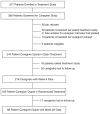Treatment of late-life depression alleviates caregiver burden
- PMID: 19943833
- PMCID: PMC2872092
- DOI: 10.1111/j.1532-5415.2009.02610.x
Treatment of late-life depression alleviates caregiver burden
Abstract
Objectives: To describe the burden experienced by family caregivers of older adults with depression and to examine the positive effects on caregivers of treating late-life depression.
Design: Two-phase treatment study for major depressive disorder (MDD) that included 6 weeks of open treatment with antidepressant medication for all older patients followed by 16 weeks of randomized treatment for patients who were partial responders, comparing a combination of medication and interpersonal psychotherapy with medication alone.
Setting: Primary care and university late-life mental health research clinic.
Participants: Adults aged 60 and older participating in a randomized trial for treatment of MDD who enrolled in a family caregiver study and their caregiver (N=244 dyads).
Measurements: Improvement in patient symptoms during open treatment (lower scores on the Hamilton Rating Scale for Depression (HRSD)) and remission of depression during randomized treatment (3 consecutive weekly HRSD scores of < or =7) were examined as predictors of lower general caregiver burden and burden specific to patient depression.
Results: Caregivers reported a moderate to high level of general caregiver burden on average. Change in patient depression during open treatment was associated with significantly decreased depression-specific burden (beta=-0.22, P=.001) and a trend toward lower general burden (beta=-0.08, P=.08). Caregivers of patients who remitted showed significantly decreased depression-specific burden (F (1,76)=4.27, P=.04).
Conclusion: Treatment of late-life depression has benefits that extend to the family members on whom patients depend. Caregiver education and support may strengthen these effects.
Conflict of interest statement
Figures


References
-
- Bruce ML, Ten Have TR, Reynolds CF, III, et al. Reducing suicidal ideation and depressive symptoms in depressed older primary care patients: A randomized controlled trial. JAMA. 2004;291:1081–1091. - PubMed
-
- Reynolds CF, III, Dew MA, Pollock BG, et al. Maintenance treatment of major depression in old age. N Engl J Med. 2006;354:1130–1138. - PubMed
-
- Unutzer J, Katon W, Callahan CM, et al. Collaborative care management of late-life depression in the primary care setting: A randomized controlled trial. JAMA. 2002;288:2836–2845. - PubMed
-
- Lenze EJ, Dew MA, Mazumdar S, et al. Combined pharmacotherapy and psychotherapy as maintenance treatment for late-life depression: Effects on social adjustment. Am J Psychiatry. 2002;159:466–468. - PubMed
Publication types
MeSH terms
Substances
Grants and funding
- T32MH19986/MH/NIMH NIH HHS/United States
- K23 MH067710/MH/NIMH NIH HHS/United States
- P30 MH071944/MH/NIMH NIH HHS/United States
- K01MH065547/MH/NIMH NIH HHS/United States
- KL2 TR000146/TR/NCATS NIH HHS/United States
- R01 MH043832/MH/NIMH NIH HHS/United States
- T32 MH019986/MH/NIMH NIH HHS/United States
- KL2 RR024154/RR/NCRR NIH HHS/United States
- K01 MH065547/MH/NIMH NIH HHS/United States
- K23 MH073772/MH/NIMH NIH HHS/United States
- K23MH073772/MH/NIMH NIH HHS/United States
- R01 MH37869/MH/NIMH NIH HHS/United States
- R01 MH037869/MH/NIMH NIH HHS/United States
- R01 MH43832/MH/NIMH NIH HHS/United States
LinkOut - more resources
Full Text Sources
Medical

